|
|
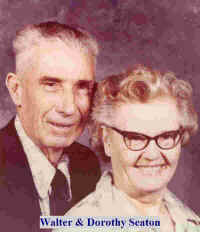
|
In Memory of
. Our Parents Carl, Marjorie, Leon, Norman, and Patricia
|
Updated 11-Feb-08
 For more pictures and information about Walter, go to
Walt Seaton
For more pictures and information about Walter, go to
Walt Seaton
~ Walter H. Seaton ~
|

Walter, late 1920s or
1930
|
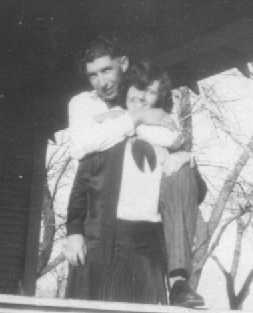
Walter
& Dorothy, about 1931 |
|
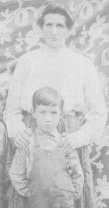
|
|
In
the above photo, Walter looks about 5 years old; if so, this would have
been taken about 1910. Notice his straight hair. It
became curly later on, after an illness. His mother was
Martha Jane "Jenny" Caton Seaton. His dad was John
Henry Calaway Seaton.
Both
sets of Walter's grandparents are buried in the same tiny cemetery as
Martha & John. It's located in Taney County, Missouri.
|
By Marge Marshall, Father's Day, 1991. Script for a talk for
Joy Ministries Fellowship (now known as the Prime Timers), Northland
Cathedral, Kansas City, Missouri
GOD'S INFLUENCE IN ONE MAN'S LIFE
My Dad
Introduction:
My dad, Walter Seaton, was a quiet, disciplined man. He
was also stubborn and opinionated. But God got hold of him and changed
his life. This is his testimony. He's not here to give it himself
because he went to be with the Lord in 1982, at the age of 77. Not that
he would have given it himself--he was not one to speak up in
public--but also he believed that if people couldn't see it in your
life, there was no use trying to tell them, anyhow.
A. Dad was born January 26, 1905 in Crane, Missouri, in Stone
County, not far from what is now Silver Dollar City. There are still
Seatons down there. The Hillbilly Family on the postcards and
calendars? My distant cousins! Seriously!!
B. Anyway, back to Dad. He was the youngest of 6 children, 5 boys
and a girl. He was born in a tent, because his parents were
separated at the time. Grandma Seaton died in 1928 or so, when he
was about 23; dad had served as her nurse for several years. Dad's
big sister, my Aunt Byrdie, always seemed more like my grandmother
than my aunt. She was the best possible example of Ozark hospitality
you could find. If you've ever visited "Old Matt's Cabin"
near Branson ... that's just like visiting Aunt Byrdie and Uncle
Ben.
C. Education
1. Dad went to a little country school, Antioch School in
Taney County, Missouri. It was just across Bear Creek from what
was then the family farm. We still visit the little Seaton
family cemetery near there. Both sets of Dad's grandparents are
buried there, and so are his parents.
2. Dad's formal education ended after the 8th grade. I've
often wondered how far he would have gone if he'd been able to
go to college.
D. Religion -- the Pentecostal revival came to the Ozarks when
Dad was about 10. It attracted everyone's attention, and my Grandma
Seaton got saved and filled with the Baptism of the Holy Spirit. So
did many others. But some didn't really dedicate their lives to the
Lord and soon fell away, spiritually. As a young teenager, my dad
took his eyes off his mother's Godly example, and focused on those
who would testify with apparent spirituality on Sunday, then live
ungodly lives all week.
E. After his mother died, Dad came to Kansas to work at the Lyons
Salt Plant. One of his brothers lived in Hutchinson, and while Dad
was visiting Troy, they went to eat in a "beanery"
(operated by my other grandmother) and there Dad met Mom. They were
married in 1931; Dad was 26, Mom was 18.
1. Mom said she just changed bosses when she got married. Dad
ordered her around as he did us children. It was that way until
she got saved, about which more later.
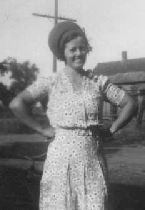
Dorothy Seaton, 1943
2. There are 5 of us, 3 boys and 2 girls. Dad set high
standards for us. One of his firmest was "If it's worth
doing, it's worth doing right." He wasn't much for outward
appearance either. I'd say something about us being poorer than
other people, because they had nicer things than we did, and
he'd say something to the effect that "Well, some people
wear everything they have on their backs!" I know now that
we were fortunate enough to be in pretty good shape because I
never even heard of the Depression until they talked
about it in a 6th grade history lesson!
F. Dad worked in the vacuum pan division of the Salt Plant in
Lyons. When briny water is steamed, eventually salt is all that is
left. Salt from the Lyons mine is used on icy roads throughout the
midwest each winter.
1. I remember a number of times the educated engineers would
call Dad late at night. The machinery had broken down and they
couldn't figure out how to fix it. So he'd go out and show them
how.
2. He used to tell how he was almost electrocuted. He was
working on wiring when someone accidentally threw the switch.
The power grabbed him, but he was able to calm the man enough to
go release the switch. Another time, he was knocked across the
room in a similar situation.
G. Religion -- There were some shallow Christians in Kansas too.
They'd come witnessing to him and later he'd see them hiding behind
a door, sneaking a smoke. So he was still against
"church;" it was for women and kids. But he loved singing
the old church songs. We'd sit on the sofa in the evenings and he
and Mom would sing "Turn the Radio On," "Amazing
Grace," "The Hallelujah Side," "Precious
Memories," and "How Beautiful Heaven Must Be." He was
hungry for the Lord, but too stubborn to yield.
H. In 1947, we had moved to northern Kansas because Mom and Dad
thought they wanted to farm. The corn was rained out twice, then it
dried up and blew away. That was the end of that dream. So we moved
back to Lyons. My sister Pat was born while we were
"farmers."
I.
God knew what He was doing. We moved next door to
Mrs. Temple, who belonged to the Assembly of God.
1. Mae began witnessing about the Baptism of the Holy Spirit
to Mom, who all along was also searching for a real spiritual
experience with God. She wanted more than "head
knowledge;" she wanted "heart knowledge." Dad was
now working nights, because he had lost his seniority when he
resigned.
2. So my timid mother changed churches and began attending
the A/G on Sunday mornings, despite Dad's orders to stay away
from it. You see, it was all right for her to go to some other
church, but he didn't want her around those Pentecostal people.
But, according to Mom, when God saved her and filled her with
the Holy Spirit, He gave her a backbone. And it taught her
hard-headed husband to respect her.
J. Now that Mom was Spirit-filled, she wanted to go to church
every chance she got. Well, Dad decided she must have a crush on the
preacher, so he would drive us all to church. He would then sit in
the car and listen to the singing. When the preaching began, he'd
turn on the car radio. His favorite station was XERF in Mexico,
where they had gospel singing at 8:00 every evening. But then the
radio minister would begin preaching. Since no one was watching, Dad
would listen to J. Harold Smith, and got some good Bible teaching,
which began to sink in.

July
2001, Acuna, Mexico. Station XERF is located in Mexico,
just
across the border from Del Rio, Texas.
K. Before long, he decided
that preachers were OK and he pitched
in and helped build the new church The other volunteer builders
valued his common sense, because where the architect had failed to
leave good instructions, Dad figured out what should be done.
L. Howard and I were married in 1952 and I went off to California
for two months. When I returned, I had a new Dad! Mom had noticed
some changes in him and one day she had commented that he probably
should begin working on not losing his temper now that he had
stopped "swearing" and he said, "You don't think I
did that by myself, do you?" That was how he told Mom that he
had given his heart and life to the Lord.
M. They immediately began having prayer together each evening,
and Dad started reading the Bible. Several years ago, Mom and I were
going through some old papers, and we found his 1952 account books.
Where he had been listing the dollar a week he'd been giving Mom to
put in the offering, we found that he immediately began showing 10%
of his income as he began tithing.
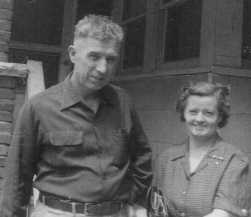
Dad
& Mom, about 1957
N. Soon he too received the Baptism of the Holy Spirit, at home,
praying with Mom. He still wouldn't testify before the congregation,
though.
O. Early on Thanksgiving Day in 1964, when Dad was 59, he lost
his right hand in a job-related accident.
1. Bleeding profusely, he could feel himself passing out, so
he began singing "Amazing Grace." Immediately, the
bleeding stopped, and his strength returned. The men with him
were almost in shock and unable to think clearly. So he calmed
them down, telling them to call the ambulance and my Mom. When
it arrived, he was standing up telling the driver how to back in
-- then he rode up front with the driver.
2. Mom met him at the hospital, where they insisted he get on
the gurney. As they wheeled him to the operating room, Mom was
holding his other hand and they were singing Ira Stanphill's "I Know Who
Holds Tomorrow and I Know Who Holds My Hand." The surgery
was to clean up the wound. The doctor commented on the fact that
he apparently had not bled any because no transfusion was
needed. God had restored the lost blood!
3. The entire hospital staff was amazed at Dad's recovery.
Most people who lose part of their body go into shock a certain
number of hours after the accident. Dad didn't. Most stubs
atrophy, so that the prosthesis can't be fitted too soon, but
Dad's never did. He kept too active. The day he went home from
the hospital he was using a hammer, steadying his left hand with
his right stub, bandage and all.
P. Gradually, my Dad changed again. He became more gentle and
tender-hearted, less sarcastic and judgmental. So it was all part of
God's plan. He and Mom even began singing specials at church, some
of those old songs he always loved. I can still see him keeping time
by swinging his arm with the hook attached. One of their favorites
was "Job's God Is
True."
Q. He used to give Howard advice on pastoring. "Don't tell
people where to sit in church; just be glad they came." And,
"Always sing all the verses of the songs. God gave the
song-writers the words, and it's not right to leave any of them
out."
R. Dad really never could bring himself to say two things:
"I'm sorry" and "I love you."
1. Because he tended to let things build up and then he'd
finally lose his temper, there definitely were times he needed
to apologize, but we learned to read his actions and knew what
he meant. The same was true about showing his love and
appreciation for us.
2. In his final years, I decided to become a little more
demonstrative and always hugged him when we were leaving to
return home. It touched him and I know he appreciated it.
S. He had a pretty good sense of humor. But he would never admit
to being surprised or to hearing anything new. If you told him a
funny story, he'd laugh and say, "I kicked the slats out of my
cradle the first time I heard that."

About
1959
T. But he was best at taking authority over situations, which
apparently influenced me, even though I was not aware of it.
1. When we were pastoring in Concordia, Kansas about 25 years
ago, one winter I worked as night waitress and cashier in a
little café north of town (we were having financial problems).
On Saturday nights, the gambling, drinking crowd from the VFW
club would come in for a late night breakfast before going home.
2. One night a fight broke out. There was no phone to call
the Sheriff's office--it was next door in the gas station. I
knew something had to be done. Suddenly (to my own amazement) it
was as though my dad clicked on in the back of my head. I
slammed my hand on the counter to get everyone's attention and
said in an authoritative voice, just like Dad's, "I want
it QUIET in here!!!" You could have heard a pin drop.
Then I gestured at the two fighting men and said in the same
tone, "And you two, SIT DOWN!!" And they did.
No more problems!
U. After Dad's accident, he took a disability retirement. Then he
became a detective. Technically speaking. The security company for
the Salt Plant hired him as night watchman because he knew the plant
so well. Eventually, he had to retire again, when Parkinson's
disease took its toll.
V. Mom cared for him as long as she could, but finally had to
place him in the Lyons Good Samaritan Home. We thought he'd fight
it, but he accepted it for Mom's sake.
W. The last time Howard and I saw him, we took Kari and Jason,
our two older grandchildren, to see him. As I looked at him, I knew
he was suffering because even though he was virtually paralyzed and
could hardly speak coherently, his mind was active, and I prayed, Lord,
please don't keep him here this way. Four days later, a
fast-acting pneumonia took him within an hour. Pat, my sister called
me at work and said, "Our dad's gone."
X. At his funeral, we had the congregation sing "Amazing
Grace" and "When We All Get to Heaven." We knew he
would have liked that.
Conclusion:
I was like all children, I guess. My parents got smarter
as I grew up. I know now that Dad taught me to do a good job, to be
consistent, to be thrifty. He taught me to think logically and
analytically (to stay ahead of him!) But most of all, I'm thankful I got
to see God work in his life. God took a hard-headed, opinionated man and
made him the kind of Christian that his wife and children, the people he
worked with, and the ones he went to church with could look up to with
respect and admiration.
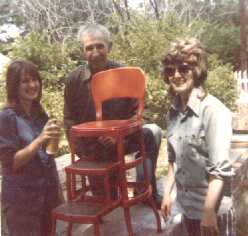
1974
- 3 generations. Walter, with daughter
Pat Crawford and grand-daughter Janet
Marshall
Mom and Dad celebrated 50 years of marriage in 1981. We had a nice
celebration with them on March 7. All five children and our mates came:
Carl & Vernie Seaton; Marge & Howard Marshall; Leon &
Roberta Seaton; Norman & Sharon Seaton; and Pat & Gary Crawford.
We had a photographer there. Some of the grandchildren came also.
Dad passed away at age 77, in Lyons, Kansas, where he is buried in the
Municipal Cemetery. He died April 1, 1982; his funeral was Monday, April
5, at 10:30 a.m. in the Assembly of God Church. Pastor Carl Swink
officiated. Pallbearers were Fred Olds, Manuel Sepulveda, H. J.
"Slim" Matthias, Dennis Schwerdtfeger, Neal Phillips, and Ted
Pyatt. Organist/soloist was Erma Small Prigmore; she sang "Until
Then." Congregational songs were "Amazing Grace" and
"When We All Get to Heaven." All three songs were among Dad’s
favorites.
In addition to us children, our mates, and our family members, some
of the Seaton relatives from Missouri came: Pete & Judy Seaton; Lola
Seaton Brown; Alfred Seaton; Homer & Pauline Seaton; and Ray &
Lillie Seaton. All were from Uncle Ralph’s family and lived in the
Springfield area.
.
|
LYONS DAILY NEWS, Friday, November 27, 1964
American Salt plant employee
loses hand in screw conveyor
Walter Seaton of Lyons lost his right hand early Thursday morning
[Thanksgiving Day] at the American Salt plant when it became caught in a
moving screw-type conveyor.
Seaton, in his late fifties, was rushed to the District hospital in
Lyons where a mangled portion of his right forearm was amputated.
Seaton has been with the company since June, 1947. He was a vacuum
pan operator
and was working with the machinery when the mishap occurred. A fellow
worker on the night shift helped Seaton off the machinery after the hand
was severed, assisted him to the boiler room and immediately summoned
the ambulance, according to Plant Manager William Shirley.
Seaton was still confined to the hospital today and so far has not
been allowed visitors.
|
|
LYONS DAILY NEWS, Saturday, December 5, 1964
Thanks to everyone for all visits, cards, kindnesses and
prayers following my accident. Remember folks, when the devil
rolls a mountain in front of you, with the Lord on your side, it
does not make a good mole hill. Walter Seaton
|

This
photo was taken in the 1950s.
|









